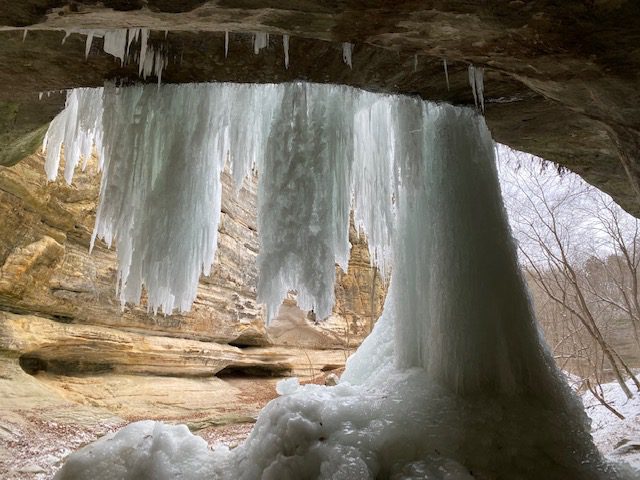The snow blew across the open fields. Sometimes I could see the yellow line as I maneuvered the back roads. As the sun moved higher in the sky, shadows fell long and dark. The lighting was spectacular on the barns and trees. I wanted to stop and take pictures but was worried about becoming an obstacle for other drivers.
I was listening to the radio and became ridiculously uncomfortable when “Amie” didn’t follow “Falling In and Out of Love.” Is that what happens when you grow up listening to albums, rigidity or comfort in sequence? I dunno. I wanted to stop then, too, and play Amie on Spotify for some kind of weird symmetry, logic, or balance. Even that potential closure wasn’t worth pulling over.
I kept driving.
It was sooo cold when I parked and headed toward LaSalle Canyon. It was early, frigid and there wasn’t anyone else on the trail. I was excited! Cold means good ICE, right? Well. Yes and no. Maybe the ice was too good. When I arrived, it appeared that ice climbers had been on the Falls and broken half of the lower portion, leaving huge ice shards scattered beneath. It was still beautiful, but it could have been astounding. Unfortunately, there are just a few weeks each year that we have the potential for excellent ice falls at Starved Rock.
I fought back anger and disappointment. I understand the importance of outdoor recreation but at what cost? The story I told myself about ice climbers is WAY better than the possibility of vandals. Regardless, it was clear. Humans destroyed the ice in LaSalle Canyon.
I sat and pondered this in the cave behind the falls for a long time. It was warmer out of the wind. I looked at the thin ice threads hanging from the thick, jagged, broken areas and realized that Nature’s immense sculpture was already repairing itself. I could see it recovering slowly, one freezing drip at a time. Nature is resilient. I know this to be true but needed to see it with my own eyes. I laughed, my spirits lifting a bit as I stood up with determined resignation.
As I made my way back to the parking lot, a new thought occupied my mind. Nature will surely survive humans. Mushrooms and worms might compost the flesh and lichen the hard things. Water will rust the metals and time will neutralize toxins. “Civilization” might be covered with vines, squeezing the memory of humans from the planet. There is no doubt that Nature will survive humans; the question is, are we going to survive ourselves?


That’s a very good question indeed.